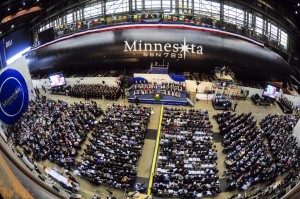 Secretary of the Navy Ray Mabus created a bit of a stir yesterday when he postponed the Christening of DDG-1000, the lead ship of the future Zumwalt Class of destroyers. I think the Navy missed an opportunity to gracefully reorient a tired ceremony that has been, in large part, rendered obsolete by new shipbuilding technology and modern shipbuilding practices.
Secretary of the Navy Ray Mabus created a bit of a stir yesterday when he postponed the Christening of DDG-1000, the lead ship of the future Zumwalt Class of destroyers. I think the Navy missed an opportunity to gracefully reorient a tired ceremony that has been, in large part, rendered obsolete by new shipbuilding technology and modern shipbuilding practices.
I know that, for a ship, a Christening is an important event. The splashing of commissioning fluid on the bow and the imparting of a traditional blessing to those who sail aboard the vessel is a timeless tradition, and I don’t propose eliminating the ceremony–just downsizing the event so it better aligns with the flow of modern naval shipbuilding.
For the Navy, a ship Christening has become an enormous event–a weekend full of parties, receptions, speeches, bands, crowds of thousands…which, in the past, led to a climactic smashing of a champagne bottle on the bow, seconds before the ship rolled down the ways and into the water.
But shipbuilding technology is changing all that.
Today, most Navy ships are delicately lowered into the water, in a process that is, in essence, as exciting as watching paint dry. Technology has stripped Christening of drama–marking the very moment a ship hits the water. Today, in some yards, there is no real correlation between when the ship hits the water and when it gets Christened. And moving Christenings into a modern, efficiency-minded yard–where serial production is underway and space is at a premium–is a huge distraction. Work grinds to a halt as civilians invade the production facility, putting in stages, seats, sound-systems and security for the big non-event.
That should all change. For ships that are not sent “down the ways”, the Christening should be downsized and made exclusive and more intimate, so that a small, high-ranking party (SECNAV, Sponsor(s), crew and shipyard reps) fly in, smack some champagne on the bow just before the ship is lowered into the water (as it should be done, frankly), and fly out. Make the Christening a low-key event with some good media access.
Move the “big” party to another day.
In my mind, the “big” party should happen once the ship is delivered.
Supporters of Christenings defend the pomp and circumstance as a celebration of the shipyard and the workers. That’s all well and good, but nowadays, Christening marks more of a mid-point of construction than completion. A whole lot of work gets done after the ship is launched. Most of the shipyard folks watching the process want nothing more than the get the ship completed and gone–and they are calculating the money they’re loosing in idling the yard.
Celebrating delivery (or, better yet, departure) is a natural time for the Sponsor and the Navy to congratulate the workforce. It can make the event far more accessible, too–by the time the ship is ready to deliver, the ship can often be moved to an area that is either more accessible to the local public or to an area less disruptive to the yard work itself (Take a second to imagine the knotty issues of getting uncleared folks into and out of a yard where classified work might be going on–it’s not fun). So I challenge the Navy. Make delivery/departure the big, accessible celebration–have the sponsor send the vessel on its way from it’s birthplace. More of the crew will be aboard, and they can use the event to help really tie the plank-owning crew together.
A Christening is–for all its noble tradition, is dying in a toxic tar pit of increasingly tough-to-justify pomp. It can still be a PR event, but make it smaller, more intimate. I don’t know a single sponsor who would object to a chance to fly in and bond with the yard and crew–rather than to just be one in a conga-line of distinguished speeches who gets to close the event by smashing a bottle on a bow.
For most naval combatants, shipyard departures and deliveries are done with far too little pomp given the palpable pride (and yes, on occasion, relief) the yard has in seeing a ship deliver and leave the yard. Throwing a party and seeing the product of a yard–of a town–of a region–depart to enter a life of national service in the greatest Navy in the world can–and should–be celebrated.
